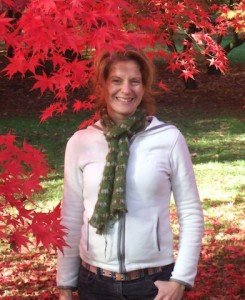Gloria’s Interview with Dr. Elinor Breman
This interview was conducted by Editor-in-Chief Gloria Robinson, with palaeocoelogist Dr. Elinor Breman.

Dr. Elinor Breman
Elinor (pictured above) is a member of the Pencils for Africa team.
She is an ecologist, environmentalist and academic with a passion for trees. She is a strong believer in recycling and the frugalis creativus motto of Pencils for Africa speaks to her heart.
She is involved with the Student Council at the Lycée International near Paris, France, in their pencil drive and fund raiser for Pencils for Africa.
Elinor gained her D.Phil. from The School of Geography and Environment, Oxford University in 2010.
Her thesis examined the drivers of vegetation change at the present-day grassland-savanna ecotone in the Mpumalanga Province of South Africa. Mpumalanga province borders Swaziland as well as the Gaza Province, northeast of Mozambique and the Maputo Province, east of Mozambique. Elinor has worked in tropical rainforest ecology in Costa Rica, restoration ecology in Madagascar, and run environmental expeditions to Nicaragua. Elinor helped research this article on the endangered African Pencil Tree.
Gloria Robinson, Editor-in-Chief
Question from Gloria Robinson for Dr. Elinor Breman
From my recent interview with Amanda France, the co-producer of the I. Pencil movie [https://pencilsforafrica.com/interview-with-amanda-france-assistant-producer-of-the-i-pencil-movie] the lesson I learned is that the production of a pencil is part of a dynamic economic process that teaches insightful lessons about how people work together as an economic community to create a useful and functional tool such as a pencil.
Given all the above Dr. Breman, could you kindly share with us your thoughts on all the dimensions you think are relevant to the pencil in our modern lives and world today?
For example, what about the dimensions of Economics, Ecology and Ethics as they apply to the pencil?
What does the pencil mean to us, and to others?
The inequality in the distribution of global resources, and the consequences are quite staggering.
Elinor’s Responses to Gloria’s Question
Gloria, I think you have already hit upon the dimensions relevant to the pencil in our modern lives and the world today! I would say that it is often by contemplating apparently simple things, such as a pencil, that we can begin to understand some of the complexities associated with their place in the world, just as you have described in your introduction.
The Pencil and Economics - What could I add to I, Pencil on this topic?
The Pencil and Ecology – Where do the natural resources required to make a pencil come from, and at what environmental cost?
Again, these are touched on in I, Pencil and the movie co-directed by Amanda France whom you interviewed, as well as by Mr. Allan Schwarz who highlights the need to recycle and manage resources.
The Pencil and Ethics – What does the pencil mean to us, and to others? The inequality in the distribution of global resources, and the consequences are quite staggering.
You highlight this in relation to the pencil: we often discard these items without a thought; many in Africa cherish even small pieces of pencils as a passport to education, as shown by Pencil for Africa’s Global Ambassador, Mr. Jackson Kaguri.
For me the three themes you mention, Economics, Ecology and Ethics, cannot be considered separately.
The issues surrounding the three are so interconnected, each having knock-on effects on the others.
To me, when I think of the pencil, I think first of the Ecological side – and how this then affects, and is in turn affected by, Economics and Ethics.
Ecology
Of the Ecological sides to the pencils’ story, I start with the tree, the wood that makes the casing of most pencils. Which species offers the best material? Where do they grow? Can they be grown in plantations?
Economics
Economics then comes in – maybe another, less suited species is cheaper to bring to the market, possibly because of where it grows naturally, possibly because other species, such as the African Pencil Tree, have been logged to such an extent that they are now rare and threatened.
Ethics
Then the Ethics – should we be logging native forests? How can sustainable practices be implemented?
Do outsiders have the right to try and prevent local resource exploitation, especially when they have so thoroughly decimated those at home? These sets and permutations of questions could be applied to whichever aspect of the pencil we choose to consider. We often take things such as pencils for granted, especially in our Western societies with ready access to such a basic commodity. Indeed, many might even spurn a plain lead pencil in favour of colourful ones, or pens.
Learning about the path that something like a pencil followed to reach our hands can only enhance our understanding of the interconnectivity of things in the world and our role as stewards and citizens of a global community. By seeing the pencil through others’ eyes we begin to question our values and things that we normally take for granted.
In a world that grows more technological every day it is good to unplug for a moment and contemplate the pencil.
I am enjoying and learning from the journey that we are all taking with the pencil at Pencils for Africa.
















